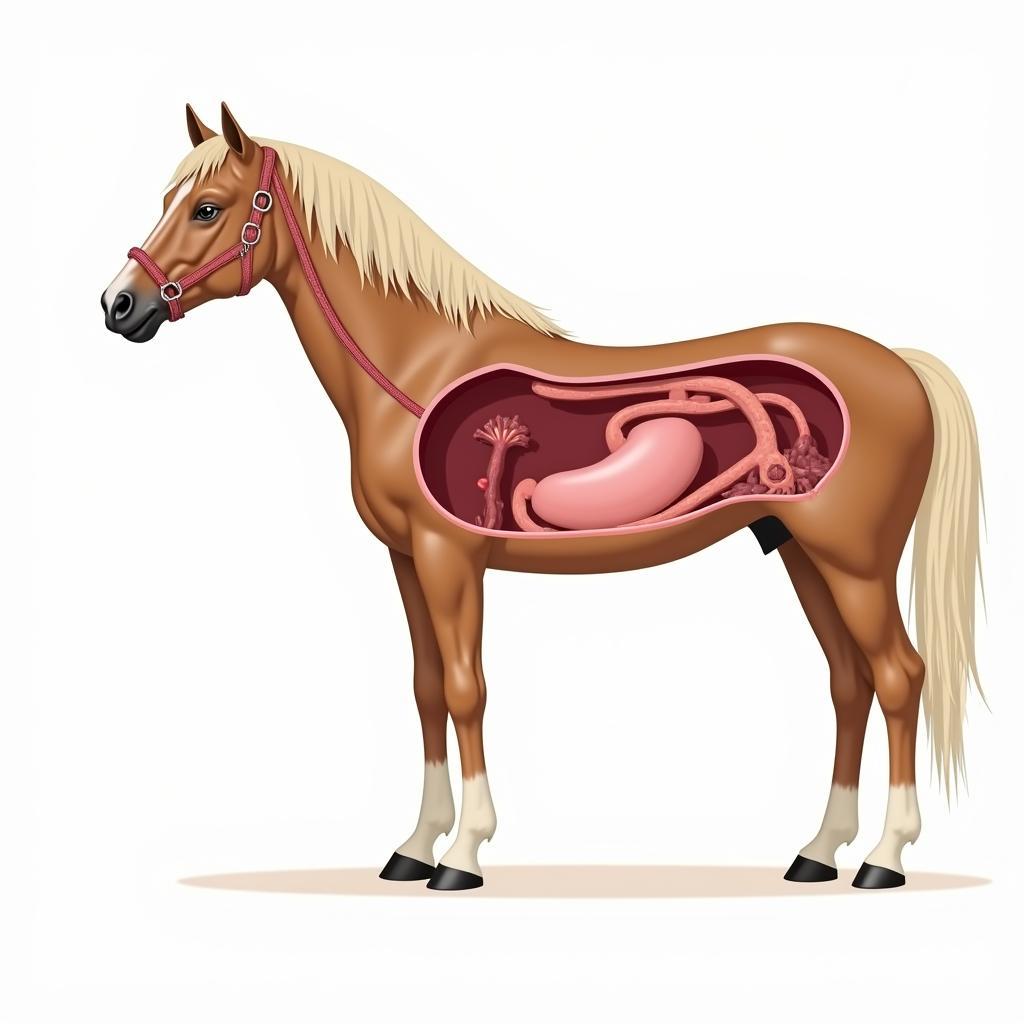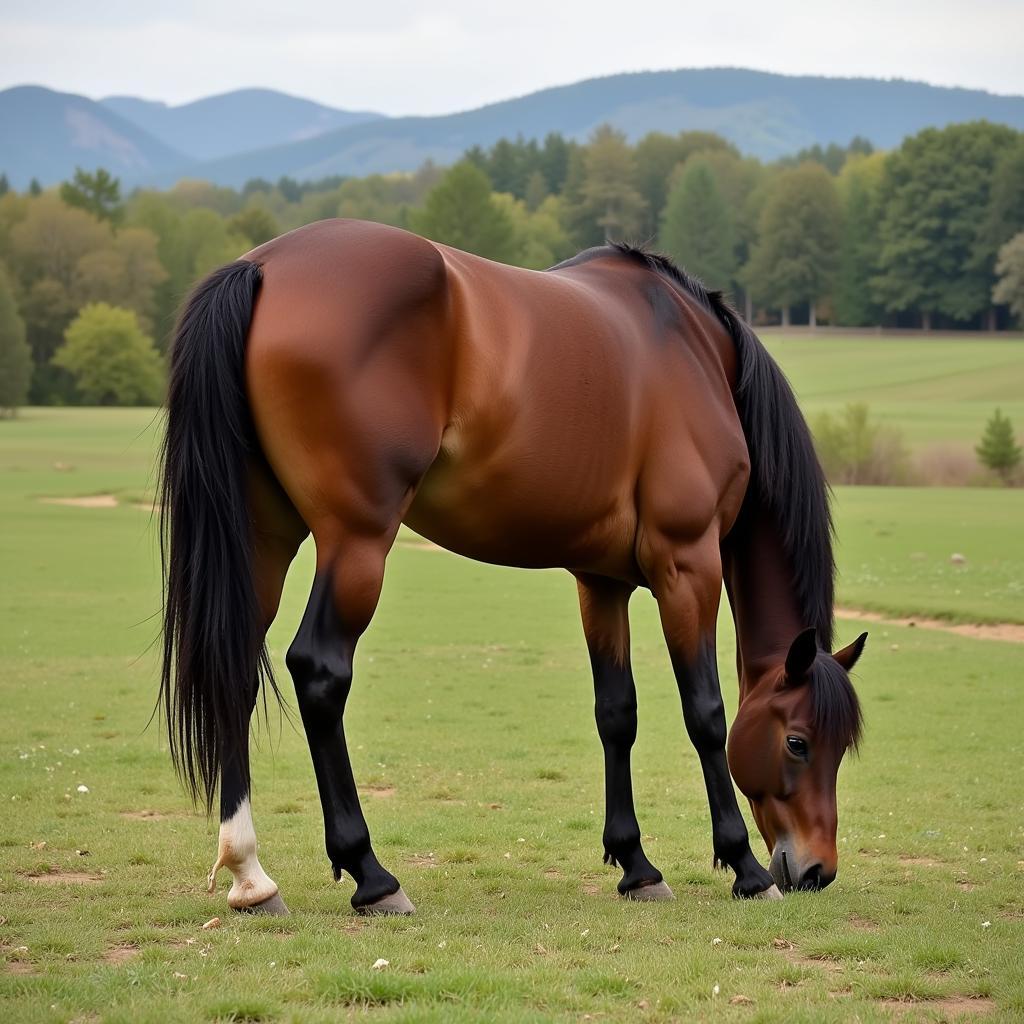We’ve all experienced the unpleasantness of vomiting. It’s a natural bodily function that helps most animals expel harmful substances. But what about horses? Can A Horse Vomit? The short answer is no, not really. Horses have a unique digestive system that makes vomiting nearly impossible. Let’s delve into the fascinating world of equine digestion to understand why.
The Anatomy of Equine Digestion: Why Horses Can’t Vomit
Horses have a complex digestive system specifically designed to break down tough, fibrous plant material. Several anatomical factors contribute to their inability to vomit:
- Powerful Lower Esophageal Sphincter: Imagine a one-way valve much stronger than in humans. This muscular ring, located where the esophagus meets the stomach, prevents food from backing up.
- Stomach Position and Angle: A horse’s stomach sits higher and at a different angle than in humans, making it difficult for contents to be expelled through the esophagus.
 Horse Digestive System Illustration
Horse Digestive System Illustration - Weak Vomit Reflex: Unlike humans, the vomit reflex is weak in horses. This neurological response that triggers vomiting is not as developed, making it highly unlikely to occur.
The Dangers of a Horse Trying to Vomit
Because of these anatomical features, vomiting is extremely rare in horses. If a horse does attempt to vomit, it’s a serious situation requiring immediate veterinary attention. The pressure from attempting to vomit can cause:
- Esophageal Rupture: The powerful contractions of the esophagus against the closed sphincter can lead to a tear in the esophageal wall, a life-threatening condition.
- Aspiration Pneumonia: If food or liquid does manage to enter the trachea, it can lead to aspiration pneumonia, a serious lung infection.
Signs Your Horse Might Be Having Digestive Trouble
While vomiting is rare, horses can experience other digestive problems. Look out for these signs:
- Colic: Abdominal pain, often indicated by pawing, rolling, looking at the flank, or sweating.
- Loss of Appetite: A sudden decrease in food intake can indicate a digestive issue.
- Weight Loss: Unexplained weight loss often accompanies digestive problems.
 Horse Exhibiting Colic Symptoms
Horse Exhibiting Colic Symptoms - Dehydration: Check for signs of dehydration, such as sunken eyes or skin that doesn’t spring back quickly when pinched.
If you notice any of these signs, contact your veterinarian immediately. Prompt veterinary care is crucial for horses exhibiting these symptoms.
Protecting Your Horse’s Digestive Health
Prevention is key to maintaining your horse’s digestive well-being. Follow these tips:
- High-Quality Forage: Make up the majority of your horse’s diet with good quality hay or pasture.
- Gradual Diet Changes: Introduce new feeds slowly over several days to avoid upsetting the delicate balance of gut bacteria.
- Fresh Water: Ensure your horse has access to clean, fresh water at all times.
- Regular Dental Care: Dental problems can hinder chewing and digestion, so schedule regular checkups with an equine dentist.
- Parasite Control: Implement a deworming program recommended by your veterinarian to control internal parasites that can affect digestion.
FAQs About Horse Vomiting
Q: Can horses burp or regurgitate?
A: While horses can’t vomit, they can burp to release gas from their stomach. However, regurgitation, where undigested food comes back up, is unusual and may indicate a problem.
Q: What should I do if I think my horse is choking?
A: If your horse is choking, remove any food or water sources immediately. Keep the horse calm and call your veterinarian right away. Do not try to remove the obstruction yourself.
Q: Can horses get ulcers?
A: Yes, horses are prone to developing gastric ulcers, particularly those under stress or on high-grain diets.
Keeping Your Horse Healthy and Happy
Understanding your horse’s unique digestive system is essential for their overall well-being. While the question “can a horse vomit?” might seem simple, it opens the door to a deeper understanding of equine physiology and health. By recognizing potential digestive problems and following preventative measures, you can help ensure your equine companion lives a long and healthy life.
Remember, if you have any concerns about your horse’s health, don’t hesitate to contact your veterinarian. They are your best resource for diagnosing and treating any medical condition.
Need more help? Contact Justus Horses USA at 0772127271, email us at [email protected], or visit our location at QGM2+WX2, Vị Trung, Vị Thuỷ, Hậu Giang, Việt Nam. Our team is available 24/7 to assist you!